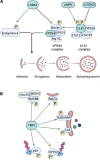The role of autophagic kinases in regulation of axonal function
- PMID: 36226074
- PMCID: PMC9548526
- DOI: 10.3389/fncel.2022.996593
The role of autophagic kinases in regulation of axonal function
Abstract
Autophagy is an essential process for maintaining cellular homeostasis. Highlighting the importance of proper functioning of autophagy in neurons, disruption of autophagy is a common finding in neurodegenerative diseases. In recent years, evidence has emerged for the role of autophagy in regulating critical axonal functions. In this review, we discuss kinase regulation of autophagy in neurons, and provide an overview of how autophagic kinases regulate axonal processes, including axonal transport and axonal degeneration and regeneration. We also examine mechanisms for disruption of this process leading to neurodegeneration, focusing on the role of TBK1 in pathogenesis of Amyotrophic Lateral Sclerosis.
Keywords: ALS; TBK1; ULK1; autophagy; axon; kinase; mTOR.
Copyright © 2022 Berth, Rich and Lloyd.
Conflict of interest statement
The authors declare that the research was conducted in the absence of any commercial or financial relationships that could be construed as a potential conflict of interest.
Figures

References
Publication types
LinkOut - more resources
Full Text Sources
Miscellaneous

